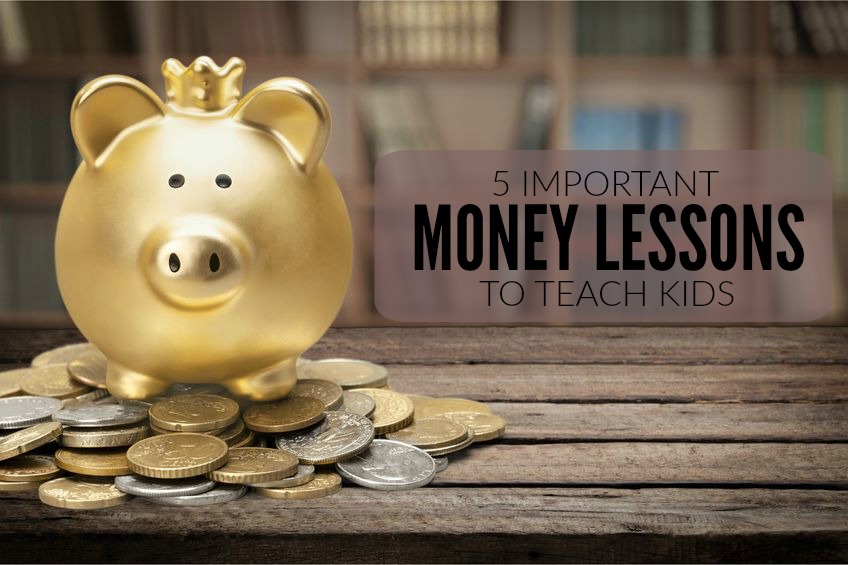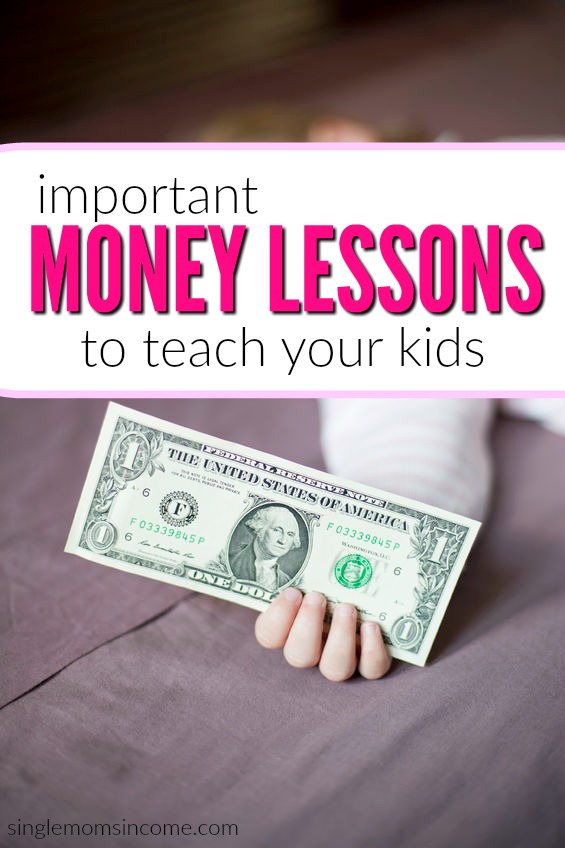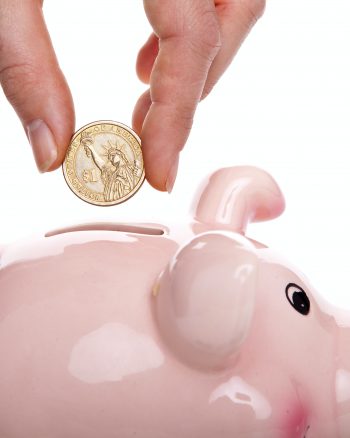 We all want our kids to be better versions of ourselves, especially when it comes to how they handle money.
We all want our kids to be better versions of ourselves, especially when it comes to how they handle money.
Everyone makes money mistakes and there’s nothing wrong with that. I made quite a few crucial mistakes with my finances before and I wish I would have learned some things when I was younger instead of having to grow up and learn them the hard way.
We can’t stop our kids from making every money mistake, but here are a few important money lessons kids need to learn in order to ace their finances in adulthood.
You Can’t Have Everything Because…
This lesson is paramount and believe it or not, some people do grow up thinking they can have whatever they want when that’s usually not the case. As a parent, it’s easy to tell your child no when they constantly ask for something, but it’s important to follow up by telling them the reasoning behind the decision.
When my son asks for toys or video games, sometimes I tell him no because we need to do other things with our money instead and I specify what those things are. For example, I might say no when he asks for a new game and my reasoning is that he might get it for his birthday or around the holidays if he behaves and keeps up with his chores, and I can’t afford it at the moment anyway because we need to go grocery shopping.
Grocery shopping might not sound that important to a child, but I remind my son that if we don’t use money to buy groceries, there won’t be anything around the house for breakfast (his favorite meal of the day) or any of his favorite snacks.
Telling your child exactly why you’re saying no will teach them how to prioritize expenses and understand that there is a time for wants and a time for needs.
Stay Within Your Budget
In other words, don’t spend more than you have. This is easy to do when you have a cash budget but parents can start preparing their kids for the temptations of overspending with a credit card by teaching them basic budgeting tips and strategies.
My son hears me say the word ‘budget’ all the time, but I can’t wait to teach him the actual meaning of the term when he gets a little older. I plan to have him make certain purchasing choices within a fixed budget like planning his birthday party with $150 or picking out all his school supplies for $40 example.
By teaching your child to work with what they have and not overspend, it helps them become more resourceful and aware that the sky is not the limit.
Save 50% of What You Earn
When your child starts earning money or even receiving an allowance, teach them to save a large chunk of it instead of spending it all. In reality, saving 10% of your income will never be enough. Everyone needs a large emergency fund to use whenever unexpected expenses pop up and to avoid debt.
I didn’t start saving money until after college and I wish I would have started setting money aside as early as when I landed my first job at 17 or even before that when I received allowance from my parents. It’s fun to spend your first paycheck and buy whatever you want when you’re young, but looking back, I had very little responsibilities when I was younger so I could have still had fun with my money and made splurge purchases while setting a decent amount aside to save as well.
A blogger I know started saving more than 50% of her income ever since she earned an income and she now has a net worth of $600,000+ at the age of 28. The earlier your son or daughter starts saving money, the better off they will be financially.
Invest In Yourself Wisely
Many adults are afraid to invest in themselves to this day and it’s sad. If you can afford to go to concerts, spend money at Black Friday sales, and dine out all the time, you should be able to invest in your professional and personal development too.
I understand that there are many scams out there, but if you want to earn more money and learn more skills, you’ll need to invest in yourself and take advantage of credible and reliable options. Don’t be the type of parent that teaches your child to only invest in objects like a toy, a laptop, or a car.
I’ve invested in conferences, courses, workshops, all of which have paid off and allowed me network, learn valuable skills, and increase my income.
Give Back
Giving back can help build character. It also communicates that there is more to live for than simply earning money for our own personal gain. You can start teaching this lesson by allowing your child to give their time by volunteering at events with organizations that make a difference.
Around the holidays, you can adopt a child to purchase Christmas gifts for and involve your whole family in the giving process. As your child gets older, teach them the importance of giving and donating whether it’s time or money.
Did you learn any of these financial lessons as a child and what do you plan to teach your children?

Photo Credit: quintanilla / 123RF Stock Photo and olegdudko / 123RF Stock Photo



These are great lessons for adults, too! 🙂
My parents always lives far below their means and it set a great example for my sister and I. It’s great to know their frugal lifestyle will be a real asset in retirement. If I ever have kids, I definitely want to pass that lesson along!
That’s a very valuable lesson to pass on. I never want my son to feel like he can’t afford his lifestyle so I will definitely be pushing frugality and showing him all the benefits of a frugal lifestyle.
My parents were excellent financial role models, I’m lucky! I just had my first child and I hope I can be a good financial role model for him. Because he’s an only child (and always will be) I want to try to avoid spoiling him too much – I really like the idea of teaching him to give back, especially during Christmas-time!
Congrats on becoming a new mom! I have an only child as well and I’m not sure if I’ll have another one yet. We also love giving back around the holidays.
This is a really good post. I think that it hits home for me because 1) I never learned anything about finances until now (sadly) and 2)i have a small child and she has no clue what money is. I don’t know if you read the book Smart Money Smart Kids by rachel Cruz and Dave Ramsey, but it is a really good read and it touches all of these points.
I too wish I would have started saving a long time ago!
Even though you got a late start, it sounds like you’re on the right track and doing a great job by beginning to teach your child about money early.
I didn’t learn any of these lessons as I child. I am better at finances now, but I’m still paying see bad impulse buys I made in my early 20’s, before I realized you have to save and budget. I want my boys to know the importance of budgeting your money as well as giving back. We do the Operation Christmas Child shoeboxes each year to show that we need to help those that are less fortunate.
That sounds like an awesome way to give back. My son used to be on the receiving end of those holiday programs so it’s so interesting and cool to be able to give to those who are less fortunate now that our family is doing better financially.
The best way to teach your kids is by example. If you tell your kids to be responsible with money but then go out and blow all your money and live from one paycheck to another, guess which lesson they’ll be more likely to learn?
I agree. Kids see everything so it’s important to practice what you preach.
I love the save 50% of everything you earn and teach them that you can’t have everything. I know when I was little, I wanted everything that I possibly could get my hands on so I only focused on the positives (getting the stuff) and not the negatives that comes with it (paying money). It resonates a lot with me because these are the exact lessons that I learned from my parents, fantastic tips!
I like what you said about your thought process in terms of buying new things. Some people don’t think about the money they are actually spending and that’s the most important part.
I enjoyed reading this post. You’re points are very valid Chonce!
Teaching kids financial responsibility at a young age is so important, because they’re going to need it sooner than they think!
One point I’d like to add: help kids decide on goals for their savings. Whether that be next year’s school supplies, parents’/grandparents birthday presents, or a lemonade stand for summer etc.
Kids, just like adults, understand the value of something when they have to use their own money to buy it.
I remember when I was a kid, I wouldn’t save because I had no goals. Now that I’m older, finding ways to save is the hard part and goals are endless!
An excellent article to show how & where kids can be nurtured to give required insight of managing their finances, when required. As parents can be the best role model to imbibe positive feel among them, also they can present various example in making them understand the value of money under the current scenario.
Hi Chonce!
Thank you for this post, very good advice. Sometimes I wish someone would have taught me about how to handle money when I was growing up. I was horrible with money, or well, I was great at spending it. Depends on what perspective you wish to look at it with. 🙂
Seriously though, as I’ve gotten older and a bit wiser I’ve learned how to manage my money. It started with a budget to get things under control and then it went to saving and investing. At first it was hard but it got easier and now our family aim is to save at least 50% of our income each month.
I agree with the points you make in this article Chonce, and I think that the most important one is to invest in yourself. I believe in life-long learning and that it’s great for the mind to always be on the hunt for new knowledge. And I will teach our daughter this too.
I will also teach my daughter about the idea of saving 50% of the income. When she’s old enough I will also add the lesson of compound interest, so that those 50% starts working for her. I figure the sooner the money can start working for her, the less she will have to work for money.
Have a nice day!
The primary thing people don’t prepare for, are just that the emergencies they don’t prepare for. That’s why its so important to do everything you can to have an emergency fund. Plus enough to take a few months off work comfortably.